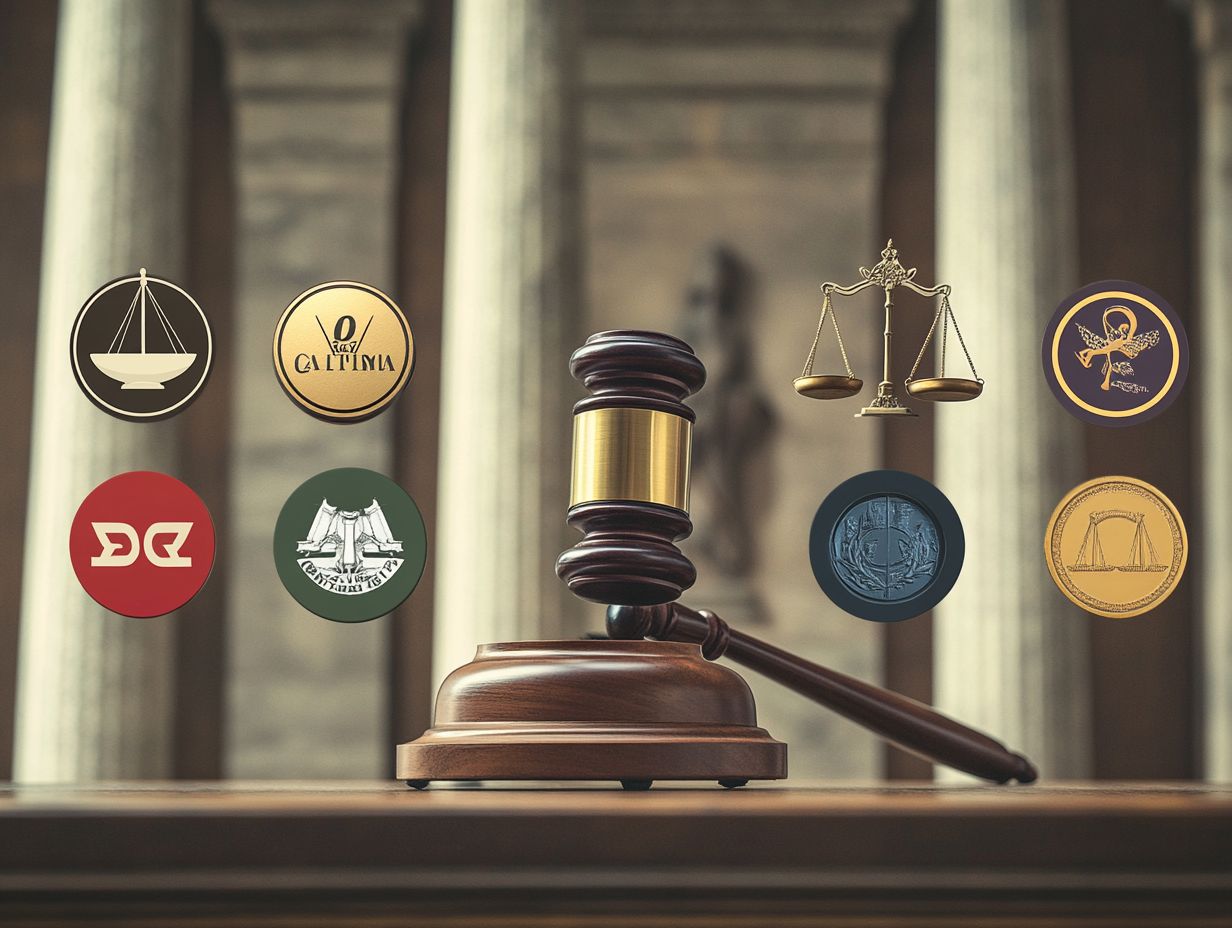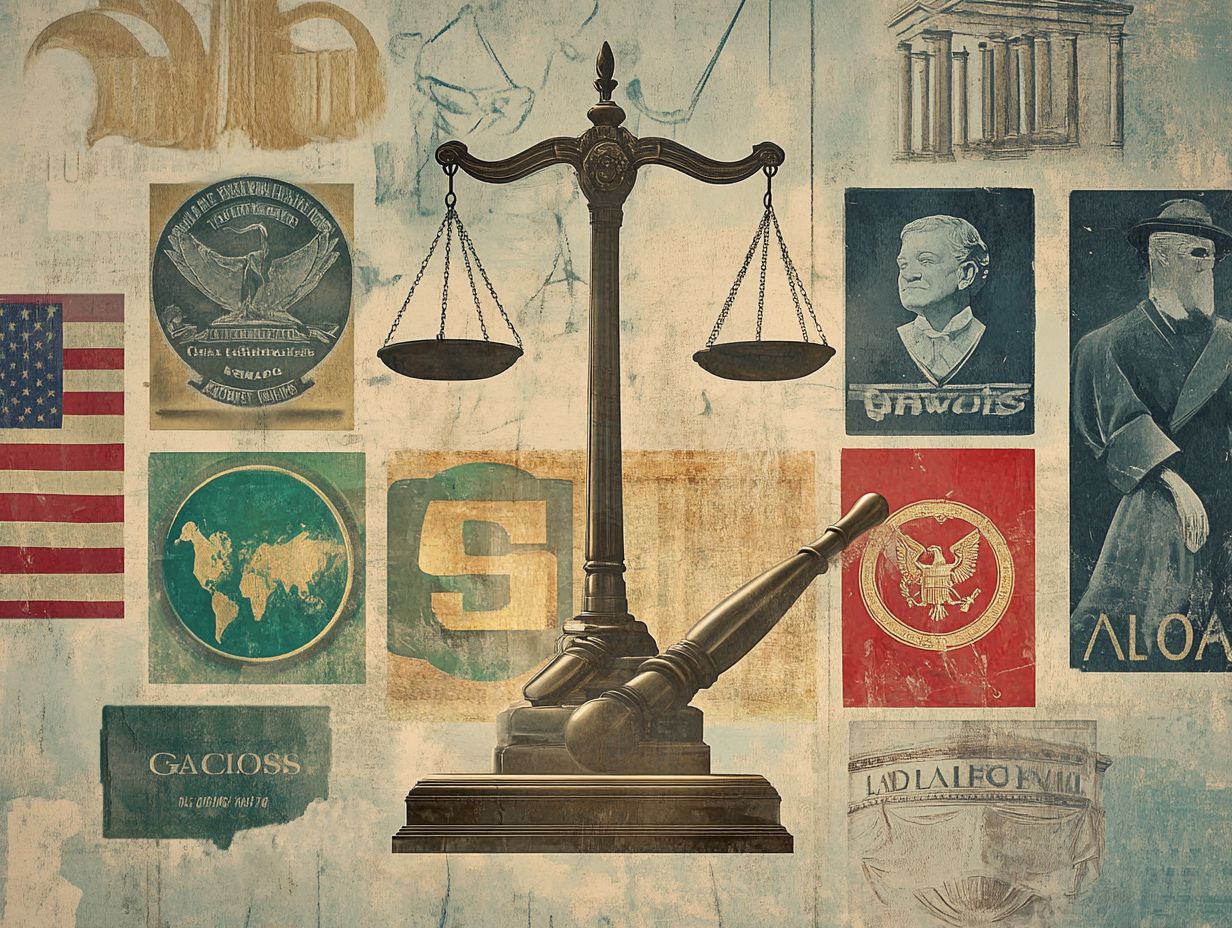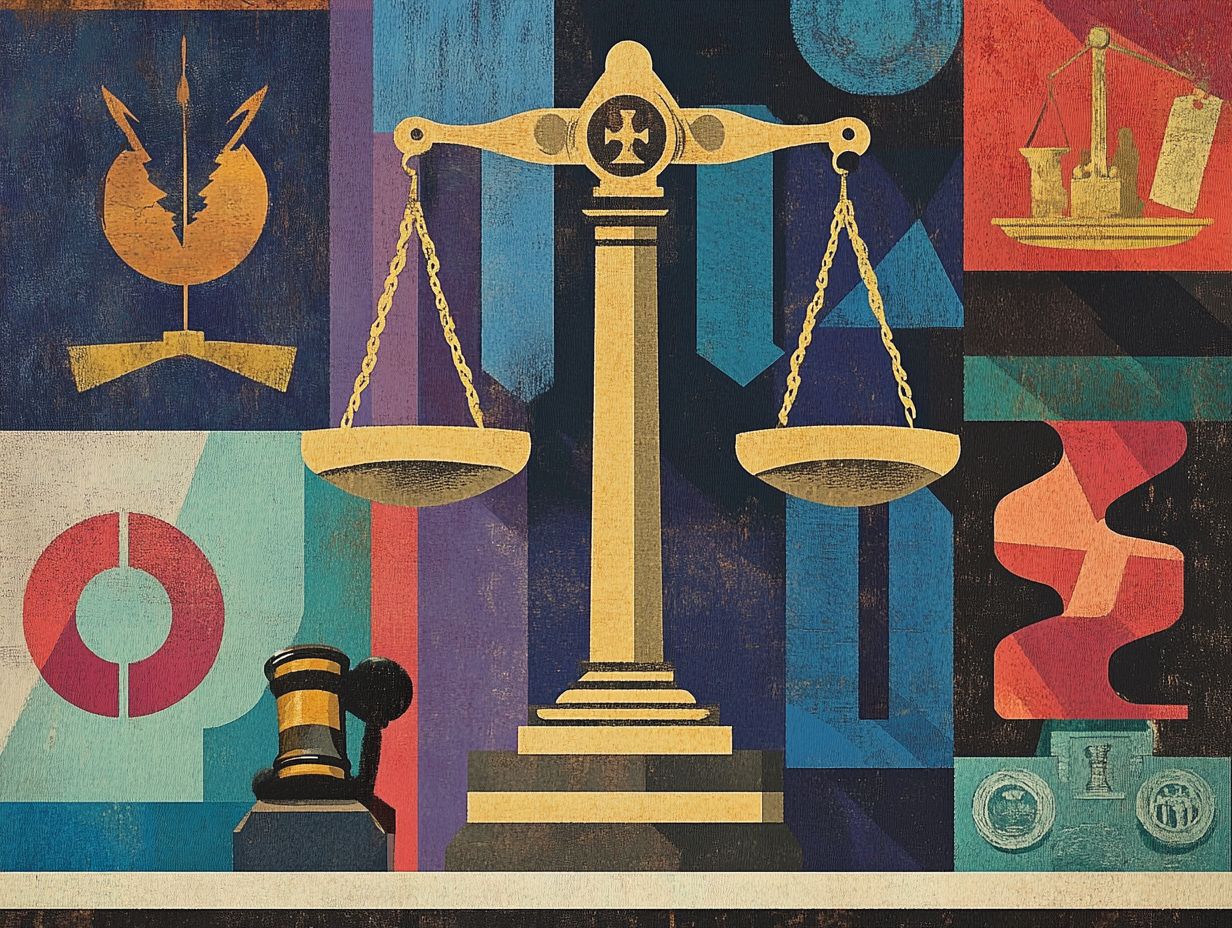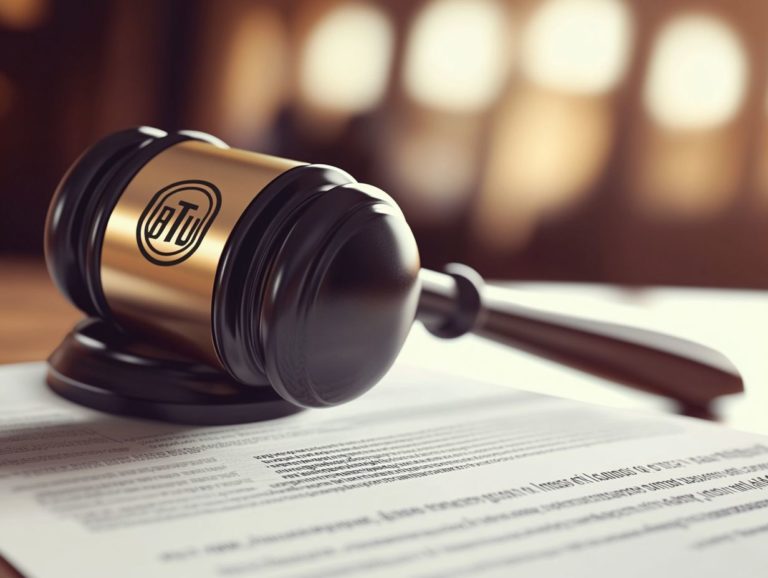5 Famous Trademark Disputes and Their Outcomes
In the realm of business, few matters ignite as much debate as trademark disputes. You ve likely witnessed iconic brands like McDonald’s and Burger King, Apple and Microsoft, and Nike and Adidas squaring off in legal battles. Each clash underscores the critical role of brand identity and consumer loyalty.
This exploration reveals five notable trademark disputes, delving into their histories, outcomes, and the ramifications for the involved companies. You ll discover what trademark disputes entail, how they can be resolved, and strategies for safeguarding your brand identity in a fiercely competitive landscape. Don t wait to understand the importance of protecting your brand!
Join us as you navigate the intricate world of trademarks and their big impact on the marketplace.
Contents
- Key Takeaways:
- 1. McDonald’s vs. Burger King
- 2. Apple vs. Microsoft
- 3. Nike vs. Adidas
- 4. Coca-Cola vs. Pepsi
- 5. Louis Vuitton vs. Dooney & Bourke
- What Is a Trademark Dispute and How Is It Resolved?
- Frequently Asked Questions
- Explore Famous Trademark Disputes and Their Outcomes
- What Was the Outcome of the McDonald’s vs. Burger King “Big Mac” Dispute?
- Why did Apple and Microsoft have a trademark dispute over the term “App Store?”
- What is the ongoing trademark dispute between Hershey’s and Mars about?
- What was the outcome of the trademark dispute between Harley-Davidson and SunFrog?
- How can companies avoid trademark disputes?
Key Takeaways:

Trademark disputes can arise between even the biggest companies, like McDonald’s and Burger King, over similarities in branding and logos.
Businesses must take proactive steps to protect their trademarks, as seen in the ongoing rivalry between Nike and Adidas in the sports apparel industry.
The outcome of a trademark dispute can have major consequences for a company, as seen in the case of Louis Vuitton successfully defending their luxury brand against Dooney & Bourke. Additionally, exploring the top 5 famous trade secret cases can provide further insights into the complexities of intellectual property law.
1. McDonald’s vs. Burger King
The legal battle between McDonald’s and Burger King perfectly captures the fierce rivalry within the fast-food sector. This dispute highlights the significant trademark issues that revolve around brand identity and potential consumer confusion. The similarities of their logos and product names resonate with a global audience.
This conflict serves as a powerful reminder of the importance of trademark registration and the legal rights that protect distinct trademarks in a crowded market. With a history stretching back several decades, these two titans have not only competed over menu offerings but also engaged in a relentless clash of marketing strategies.
Through advertising campaigns that playfully mock one another, both brands strive to capture consumer attention while clearly delineating their differences. When a brand loses a trademark dispute, it risks creating significant confusion among consumers, leading to a dilution of brand equity.
Such outcomes can drastically reshape market perceptions and consumer loyalty, underscoring the vital role that trademarks play in establishing and maintaining a brand’s reputation in a competitive landscape.
2. Apple vs. Microsoft
The ongoing conflict between Apple and Microsoft is more than just a squabble; it s a pivotal trademark dispute with far-reaching implications for trademark rights and the legal rights that protect creations of the mind in the technology sector.
This situation highlights the legal consequences that can arise from licensing issues and the fierce competition for brand recognition. As the technology landscape evolves, both companies actively take legal action to defend their iconic logos and product names, crucial to their market standing.
These disputes emphasize the significance of trademark applications and clearance processes in protecting brand identity. When companies are caught up in litigation over their trademarks, their focus on developing groundbreaking technologies often takes a backseat.
Such legal battles can create a ripple effect that shapes perceptions of brand value and may deter new entrants from pursuing creative ventures. In this dynamic environment, the delicate balance between competition and collaboration will ultimately determine how the tech industry navigates the challenges posed by these enduring rivalries.
3. Nike vs. Adidas
The rivalry between Nike and Adidas showcases athletic excellence. It also highlights brand protection and legal battles over trademarks.
These disputes illustrate the challenges brands face in maintaining distinct trademarks while trying to avoid consumer confusion, similar to the notable copyright disputes in film history.
In landmark cases, such as Nike’s confrontation with a smaller brand using a similar swoosh design and Adidas’s relentless pursuit of counterfeiters mimicking their iconic three stripes, these giants demonstrate their commitment to preserving their unique identities.
The fashion industry has seen a surge in trademark disputes as brands navigate a competitive landscape where imitation threatens consumer loyalty.
For Nike and Adidas, proactive trademark monitoring goes beyond legal enforcement; it s a key strategy to protect their legendary logos and brand philosophies.
4. Coca-Cola vs. Pepsi

The rivalry between Coca-Cola and Pepsi illustrates the fierce competition in the beverage industry, where trademark rights shape brand image and consumer perceptions.
This longstanding feud has led to numerous legal battles over trademark issues, prompting both companies to protect their iconic logos rigorously.
Both companies use legal battles to boost their brand image. Every court victory becomes part of their marketing story, engaging customers and showcasing their commitment to quality.
Through clever advertising, they often turn courtroom outcomes into exciting marketing narratives, reinforcing their originality.
Navigating these complex trademark issues is crucial for maintaining their competitive edge in an ever-evolving marketplace.
5. Louis Vuitton vs. Dooney & Bourke
The legal showdown between Louis Vuitton and Dooney & Bourke highlights the competition for brand recognition in luxury fashion. It shows how costly it can be to protect trademarks.
This dispute centers on specific logos and patterns each brand claims as their own, igniting debates over intellectual property rights.
For luxury brands investing heavily in creating distinctive identities, the stakes couldn t be higher. An infringement could damage their reputation and compromise their exclusivity.
This scenario serves as a vital lesson for other luxury labels, emphasizing the need for vigilance and proactive strategies to safeguard their trademarks.
What Is a Trademark Dispute and How Is It Resolved?
A trademark dispute arises when there is a contest over the rights to a trademark. This often leads to legal action that can significantly impact your brand identity and market position. Understanding trademark law is essential for protecting your brand!
The resolution process may involve negotiation, mediation, or court rulings. It is vital to grasp the complexities of trademark rights and the potential legal challenges that may arise.
Such disputes often stem from common causes, including:
- Trademark infringement, when someone uses a brand name or logo that is very similar to yours without permission,
- Abandonment, which occurs when a trademark owner fails to actively use and protect their rights.
Consider a notable case involving two beverage companies locked in a longstanding battle over the trademark rights to a particular slogan. Each company claimed that their use was legitimate and well-recognized in the market.
When navigating these disputes, organizations like yours typically seek the expertise of legal counsel. Experts in trademark law can help you understand your rights, obligations, and the best strategies for resolution whether through amicable negotiations or litigation.
What Are the Different Types of Trademark Disputes?
Trademark disputes can encompass a range of conflicts, such as trademark infringement, licensing issues, and challenges related to trademark clearance. Each of these presents unique risks and consequences for your business.
For instance, trademark infringement occurs when another party uses a similar mark in a way that confuses consumers, potentially damaging your brand’s reputation. Licensing issues may arise when agreements aren t properly followed, leading to unauthorized use of your trademark, which can erode its value.
Challenges in trademark clearance can also arise during the registration process, leaving your brand vulnerable to future claims. Each of these disputes can significantly impact your brand image, creating consumer confusion and potentially resulting in lost sales.
Therefore, having clear and comprehensive trademark policies in place is essential for safeguarding your brand s distinct identity and ensuring consumer trust.
How Can Businesses Protect Their Trademarks?

You can effectively protect your trademarks through a strategic blend of trademark registration, diligent monitoring, and proactive brand protection strategies.
This approach ensures that your distinct trademarks remain secure from infringement, which is critical for maintaining brand recognition and equity in competitive markets.
To start, conduct comprehensive trademark searches to identify any existing conflicts that might hinder your registration process. Next, file your applications with the appropriate trademark office, including all necessary documentation and payment.
Engage in continuous monitoring practices to stay vigilant against potential infringements, allowing for swift action when necessary. Having legal counsel by your side throughout this journey is vital; they can navigate the complexities of trademark law, offer strategic advice, and ensure you re well-equipped to protect your intellectual property.
By taking these steps, you’ll ultimately safeguard the integrity of your brand. Act now to fortify your brand against potential threats!
What Are the Potential Consequences of Losing a Trademark Dispute?
Losing a trademark dispute can severely affect your business. You might face a tarnished brand reputation, a loss of trademark rights, and significant financial costs. Understanding these potential repercussions is essential for navigating the complex trademark landscape effectively!
For example, consider a well-known brand that faced a trademark infringement lawsuit. The fallout not only stripped them of exclusive rights to their logo but also resulted in a significant decline in consumer trust.
Customers may perceive this as a sign of a lack of integrity, leading to decreased sales and diminished market share. Another notable case demonstrated that financial implications can soar into the millions, with legal fees and lost revenues mounting, while competitors eagerly capitalized on the negative publicity.
Such outcomes highlight the critical importance of proactively managing your ideas and creations that belong to you to protect both your assets and your public image.
What Are the Key Factors in Resolving Trademark Disputes?
Resolving trademark disputes involves several key factors that you should consider. This includes effective negotiation, a solid understanding of legal procedures, and the willingness of both parties to reach an agreement that respects trademark rights and brand identities.
This process demands strategic thinking and a deep understanding of trademark law to ensure a favorable outcome. In many cases, having competent legal advice can significantly shape the direction of the dispute.
Trained legal representatives excel in navigating the complexities of trademark regulations, helping you formulate a strong defense or claim.
Alternative dispute resolution methods, such as mediation or arbitration, offer a more amicable path forward, often saving both parties the time and cost associated with litigation.
You should prioritize understanding these options and seek experienced professionals who can guide you through this intricate landscape. Doing so will empower you to protect your interests while fostering positive relationships within your industry.
What Are Some Lesser-Known Trademark Disputes That Have Had Significant Outcomes?
While the headlines are often dominated by marquee trademark disputes, countless lesser-known conflicts have emerged, yielding significant outcomes that influence branding strategies and industry dynamics. To dive deeper into this topic, check out 5 notable international IP cases to know.
These legal battles show the intricate nature of trademark disputes and their broad implications for brand protection and consumer clarity. Consider a case involving a small apparel brand that found itself in a legal tussle with a major fashion label.
The court ultimately ruled in favor of the smaller entity, recognizing the distinctiveness of its designs. This verdict not only bolstered smaller businesses but also underscored the imperative for established brands to scrutinize their trademark portfolios to avoid overreach.
In another instance, a tech startup clashed with a well-known corporation over an app sharing a similar name. This dispute culminated in a settlement requiring both parties to rethink their branding strategies.
Also, these examples serve as a reminder that vigilance in trademark practices is essential. Protecting unique identities fosters innovation and competition within the marketplace, ensuring a dynamic landscape for all players involved.
Frequently Asked Questions

Explore Famous Trademark Disputes and Their Outcomes
Some famous trademark disputes and their outcomes include the McDonald’s vs. Burger King battle over the “Big Mac” trademark, the Apple vs. Microsoft conflict over the use of the term “App Store,” and the ongoing dispute between Hershey’s and Mars over the use of the color red for their chocolate packaging. For a deeper dive into these cases, check out 5 notable trademarks and their histories.
What Was the Outcome of the McDonald’s vs. Burger King “Big Mac” Dispute?
The outcome of this dispute was in favor of McDonald’s, as the court ruled that they had a valid trademark for the term “Big Mac.” Burger King was ordered to stop using the term in their advertising and pay damages to McDonald’s.
Stay informed and protect your brand!
Why did Apple and Microsoft have a trademark dispute over the term “App Store?”
Apple claimed it trademarked the term “App Store.” They accused Microsoft of using it for their online marketplace, which could confuse consumers.
Microsoft argued that the term was too generic to be trademarked. The case was settled out of court.
What is the ongoing trademark dispute between Hershey’s and Mars about?
This dispute involves the color red used in packaging. Hershey’s argues that Mars’ packaging for M&M’s is too similar to their Reese’s Peanut Butter Cups, confusing customers.
What was the outcome of the trademark dispute between Harley-Davidson and SunFrog?
Harley-Davidson sued SunFrog for selling merchandise with their logo without permission. The court ruled in favor of Harley-Davidson, awarding them $19.2 million in damages.
How can companies avoid trademark disputes?
Companies can avoid disputes by doing some research before choosing a trademark. They should register their trademarks and regularly monitor them to ensure no one else is using them.
If they notice potential infringement, acting quickly can save them from costly disputes later on. Protecting trademarks is essential for maintaining brand identity.






